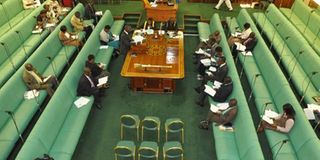Prime
MPs fail to pass Budget, students loan scheme flops

A plenary session takes place; but most MPs were absent even as the Budget deadline draws closer. Photo by Geoffrey Sseruyange
The Budgeting process is in the evening of its life. The debate on the policy statements kicked off this week. The debate on the Budget continues on Tuesday with the chairpersons for various sectoral committees presenting their reports.
The Budget Act and the Rules of Procedure set August 31 as the deadline for passing the Budget. For unexplained reasons, Parliament once again failed to beat the deadline.
Last year, Parliament was forced to tinker with the rules of procedure to pass the Shs11.4 trillion budget amid complaints from some members that the figures were not tallying.
Now that the deadline is passed, yet only three reports have been presented, the Speaker is expected to use her discretion to extend the deadline or suspend the rules of procedure and pass Appropriation Bill, 2013 without debate.
Junior Finance Minister Fred Omach last year asked Parliament to suspend Rule 118 to pass the Budget figures in the Appropriation Bill, 2012 without going through the Budget Committee. Mr Omach said after Parliament failed to pass the budget on August 31, sending the Appropriation Bill to the Budget Committee would delay the budget implementation.
On the floor of Parliament, there was confusion last week on how to treat the alternative policy statements from shadow ministers. While the rules of procedure mandate shadow ministers to table their reports on the floor, the same rules are silent on the next step.
Speaker Rebecca Kadaga on Wednesday asked the Rules Committee to fix the gap and ruled that the shadow ministers will be given a few minutes to summarise their proposals.
On a day the budget debate kicked off, there were empty seats across the political spectrum, once more confirming the notion that our lawmakers don’t take budget issues seriously. They forget that the Budget is the most important economic policy tool of the government and provides a comprehensive statement of the nation’s priorities needed in our quest for transformation.
The embarrassment of empty seats explains why for the last three financial years, the institution of Parliament has lost every single budget fight on the floor and there is little or no hope at all that this year will be any different.
Students’ loan scheme
This year, the government hoped to implement key interventions in the education sector to enhance efficiency and effectiveness, and address the quality.
The proposed Students Loan Scheme was part of these strategic interventions in the sector. The government had planned to implement the scheme initially for science, medical and engineering students in higher institutions of learning. The loan scheme was also to be complemented by the bonding of students to government employment after their respective courses, which will serve towards the repayment of the loan. Finance minister allocated Shs5.0 billion towards operationalisation of the scheme.
However, in the absence of the law to guide the process, the lawmakers on the Committee of Education expressed fears that it might be difficult for government to recover the money loaned to students.
In the proposed Bill, it is not clear how government intends to ensure that foreigners don’t benefit from the scheme and how those who normally go for Kyeyo will be traced to pay back the money. There were suggestions that the scheme be opened to students in technical colleges and that government strikes a balance between sciences and humanities.
From the meeting held this week, it emerged that the task force on the proposed SLS had approved an application form and were in the process of inviting prospective beneficiaries. But the lawmakers said the application form was illegal and that the details on the form must be based on the law. The Committee chairperson Sylvia Namabidde ruled that the SLS should be suspended until Parliament has passed a law to avoid a repeat of the losses in the botched Entandikwa scheme. Therefore, the SLS will remain suspended until further notice.
The MPs on the same committee blocked cash given to the teachers’ Saccos. In line with the government policy of encouraging savings, improve access to credit and uplift the welfare of teachers, Finance minister had allocated a total of Shs5.0 billion to support the programme. The committee demanded that a clear procedure be put in place to ensure that all teachers across the country benefit and that the money be sent directly to the Saccos in the districts not through Uganda National Teachers Association.
Tough law on corruption
In the shadows of the budgeting process, Makindye East MP John Ssimbwa tabled a new piece of legislation that seeks, among others, to amend the Anti-Corruption Act and provide for mandatory seizure of ill-gotten wealth for persons convicted of offences under the proposed law. The Bill also seeks to vest the confiscated property of the convicted person(s) with government and management of this property shall be by the public trustee appointed by the minister in accordance with the Public Trustee Act.
According to the proposed anti-corruption law, any person who deals with property that he or she believes or has reason to believe was acquired as a result of an offence under this Act, commits an offence and is liable on conviction, to a fine not exceeding 160 currency points (more than Shs3.2 million) or imprisonment not exceeding seven years.
In addressing the defects in the current law, Parliament heard that the law gives the court discretion to order for confiscation of property of a convicted person “derived directly or indirectly from the act of corruption”.
However, due to the nature of the offences under the Anti-Corruption Act, it is very difficult to prove that a particular property was derived directly or indirectly from an act of corruption. This creates a lacuna in the law given that securing a conviction does not necessarily guarantee that the convicted person will make good the loss occasioned to the government or any other organisation.
While we support the intentions of the Bill, it’s also important to note that Uganda has the best anti-corruption laws in the region. The problem is not lack of laws, but lack of implementation.
Even as the government backs Mr Ssimbwa’s amendments, it’s important that the existing laws are implemented. Because of corruption in public offices, World Bank estimates that Uganda could be losing more than Shs600b annually.
However, these are 2005 figures; there is a possibility that taxpayers lose in excess of a trillion every year. This money could be enough to fix the sick health sector and cater for the 20 per cent increment for primary school teachers.
In the sarcastic words of Cornelius Tacitus, a senator and a historian, we are reminded that “in a State where corruption abounds, laws must be very numerous.”




